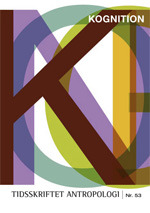ANTROPOLOGISKE KRUMSPRING I ET VIDENSSAMFUND: Om at lave feltarbejde i en agora
DOI:
https://doi.org/10.7146/ta.v0i53.106730Resumé
Taking its point of departure in their recent fieldwork, the authors explore the concept of
knowledge in two different ways. How is scientific knowledge conceived in the debate
surrounding the passage of the new Danish legislation on universities? And how is it
possible to work with knowledge in the form of humanistic research as object of
anthropological enquiry? In anthropology, knowledge, in relation to research has
especially been studied regarding the natural sciences, i.e. in laboratories. The authors
see this as a logical consequence of the development in anthropological method and
theory, where the anthropological object has increasingly been defined as an object with
a specific physical integrity – that is, as tied to a group of people and/or a physical place.
This discussion finds an interesting parallel in the debate of the new act. Scientific
knowledge is by some humanistic researchers understood as a solitary process where
demands from larger society, as well as from the institutional community are considered
restrictive, a factor that potentially pollutes the otherwise pure science. Thereby science
is perceived as a relatively autonomous field in society – quite similar to the classic
notion of culture. Arguing for an actor-network, dialogic notion of the anthropological
field, i.p. as an agora, requires a “rhizomatic” form of knowledge for humanistic research
in general and anthropological research in particular.
Downloads
Publiceret
Citation/Eksport
Nummer
Sektion
Licens
Ophavsretten til artiklerne i Tidsskriftet Antropologi tilfalder forfatteren.
Artikler publiceret i Tidsskriftet Antropologi må citeres, downloades og videresendes for ikke-kommerciel brug, under forudsætning af normal akademisk reference til forfatter(e) samt tidsskrift, årgang, nummer og sider. Artiklerne må kun genudgives med eksplicit tilladelse fra forfatter(e) og tidsskriftet.


